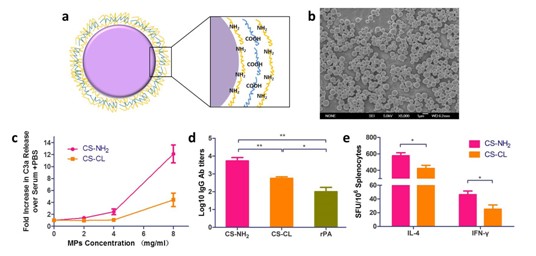Vaccination is the most effective method to prevent infectious diseases. In view of safety issues, more defined vaccines based on partially purified preparations from the organism or recombinant subunit proteins have recently been developed. However, by themselves, these types of vaccines are often not sufficiently immunogenic due to the lack of an innate immune stimulus. Hence, it is necessary to add adjuvants for facilitating the immune response.
Recently, the research team led by Prof. Ma Guanghui at Institute of Process Engineering (IPE), Chinese Academy of Sciences, explored the potential of chitosan-based microparticlesas a vaccine adjuvant with an active surface for complement activation. Traditionally, biomaterials scientists have typically sought to avoid complement activation in order to minimize side effects such as implant rejection and clearance of systemic drug delivery vehicles. However, for vaccine, complement activation is encouraged, which could generate a molecular adjuvant danger signal in situ. Based on this idea, the research team fabricated microparticles with abundant amino groups in order to explore whether these MPs could offer a potential active surface for complement activation and further induce adaptive immunity in vivo. The data provides design principles for studies of complement-activating microparticles as potential vaccine platforms. The results have been published on Biomacromolecules.2013, 14(9):3321-8. (By IPE)

Figure a. Surface chemical structure of microparticles; b. SEM images of microparticles;
c. Results of complement activation; d. Antigen-specific antibody titers; e. Cytokine production(Image by IPE)
 Search
Search




 京公网安备110402500047号
京公网安备110402500047号